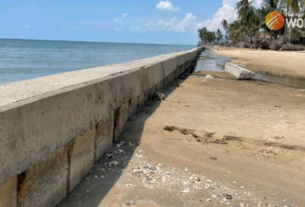Approved as demand surges requires reserve of no less than 15 per cent of peak usage
The National Energy Policy Council yesterday approved the third revision of the country’s 2010 power development plan (PDP) in response to a rise in demand for electricity driven by the government’s policy to pursue major infrastructure projects such as mass-transit trains in Bangkok and inter-city high-speed trains.
Energy Minister Arak Chonlatanon said after the meeting, chaired by Prime Minister Yingluck Shinawatra, yesterday that the council had agreed on the third revision of the PDP from 2010 to 2030.
It reflected the increased demand for power, the 20-year energy conservation plan from 2011-2030 and the plan for alternative energy to make up 25 per cent of total power generated in the next 10 years (2012-2021).
According to the third revision of the PDP, the country would be required to maintain power reserves of not less than 15 per cent of peak demand. Power reserves in the future would be sought from renewable power by 2030, which will increase to not less than 10 per cent of total power. The figure is higher than the previous PDP, set at 5 per cent.
Meanwhile, the share of nuclear power would be reduced from 10 per cent set previously to not more than 5 per cent of total power generation. The proposed nuclear power plant would be delayed by three years from 2023 to 2026 so that the country has enough time to learn from the accidents that happened in Japan last year and to secure greater acceptance from the people.
For power from coal-fired power plants, there would be consideration depending on necessity, acceptability and targets for reducing carbon dioxide. Under the PDP, buying electricity from foreign countries would be set at not more than 15 per cent of total power capacity.
Thailand is expected to have total power capacity of 70,686 megawatts in 2030 according to the third revision of the PDP. Of the total, 2,000MW would be from nuclear plants, 25,451MW from co-heat-generating plants, 4,400MW from coal-fired plants, 6,374MW from co-generation plants, 9,516MW from renewable-energy plants, 750MW from gas-turbine plants, and 6,572MW from imports.
higher cost
“By following the PDP, the electricity cost will increase to Bt4.56 per unit, up from Bt2.89 per unit currently,” Arak said.
In addition, the government would also open bids for independent power producers (IPPs) to private investors for a total of 5,400MW.
Six of these IPPs will have to use natural gas as fuel, provided by PTT. Then, PTT will further submit its natural-gas procurement plan to the council.
The council also gave approval to the Energy Ministry to construct a new 900MW power plant in Khanom, Nakhon Si Thammarat, as requested by the Electricity Generating Company, replacing its existing plant that will expire in 2016, to serve the higher demand for electricity in the South.
Source: http://www.power-eng.com/news/2012/06/08/electricity-development-third-revision-of-power-plan.html
